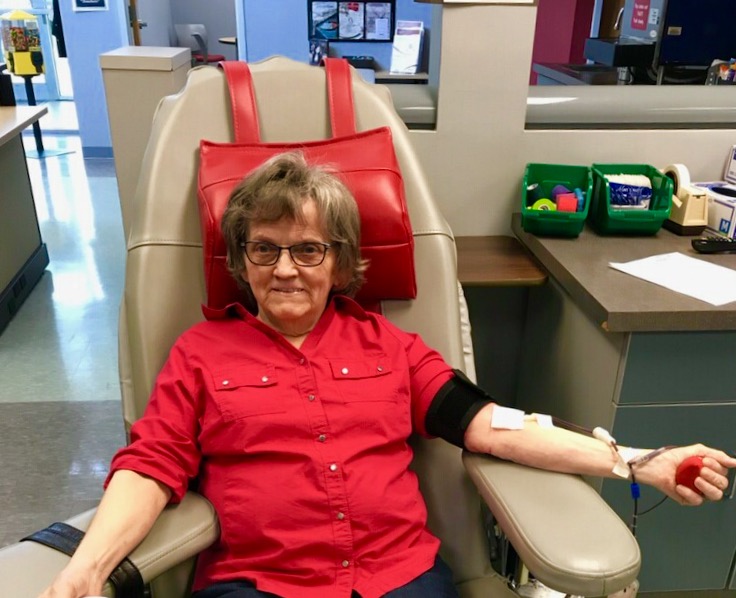By Kylie Blanchard

Deborah Vollmuth is a loyal platelet donor.
While making a donation at United Blood Services can have a significant impact on the lives, treatments, and recoveries of accident victims, cancer patients, burn victims, and transplant recipients, the need for additional donations remains great.
“There are a lot of people you can help with a simple donation,” says Ana Hernandez-Miller, telerecruiter with United Blood Services in Bismarck. “It is a huge impact.”
It is estimated only around five percent of those who can donate do so, she says.
“There are days we don’t have enough donations coming through our doors. Donors are able to provide red cell donations, platelets, plasma, or a combination of all three as a whole blood donation. We need everything and we need it all the time.”
While it is dependent on the donor, Ana says one whole blood donation can benefit two to three individuals, and a red blood cell donation can reach two to four people. In addition, one patient’s need for platelets can reach up to six units per week.
Joletta Vetter has been donating platelets at United Blood Services for nearly 15 years, starting at the urging of a co-worker.
“A mobile donation unit was going to be at my work and I was challenged by a co-worker. I did it and have been donating ever since,” Joletta recalls.
An individual is eligible to donate platelets every seven days, up to 24 times per year, and Joletta says she donates as often as possible.
“I am right in town and am now retired, so I tell them if they need me, I will be there. I’ve never made an appointment.”
She says she donates platelets because of the impact it has on others and she encourages individuals to consider donating as well.
Serena Doepke is a whole blood donor.“Everyone who has cancer or heart disease needs platelets, and I can provide them. There are so many people that can’t donate, the ones that can, should. It’s easy and you feel good when you are done.”
Ana says donors do have to meet the health history requirements listed on a questionnaire, as well as pass a check of their hemoglobin, blood pressure, and medications.
“Your eligibility is determined by your health and medications,” she notes.
Walk-ins are welcome for whole blood donations, but Ana recommends making an appointment for platelet and plasma donations, as those donations are done with automated machines.
“We do our best to inform and prepare donors,” says Ana, adding donors are encouraged to hydrate well and eat a good meal prior to donating. “They should also take it easy after their donation. There really are very few side effects.”
United Blood Services also runs monthly promotions, making individuals eligible for prizes just for showing up to donate.
The holiday season is a time of great need at United Blood Services, notes Ana.
“There are more people traveling and unfortunately more accidents. Our donations go down, but our needs go up.”
She says the local blood bank can also be impacted by catastrophic events throughout the country, and donations during these times are also greatly needed.
“You are investing a little time, but you are investing in the lives of others,” says Ana. “You are extending or saving lives. Donation is a simple, quick way to help your community and give back. It’s a lifesaving gift.”

Red Blood Cells: blood transfusions, trauma and burn patients
Platelets: cancer, heart, and burn patients
Plasma: trauma and transplant patients, rare blood disorders

Kylie Blanchard
Kylie Blanchard is a local writer and editor, and busy mom of three, who enjoys both staying active with her family and the chance to just sit and read a great book.
